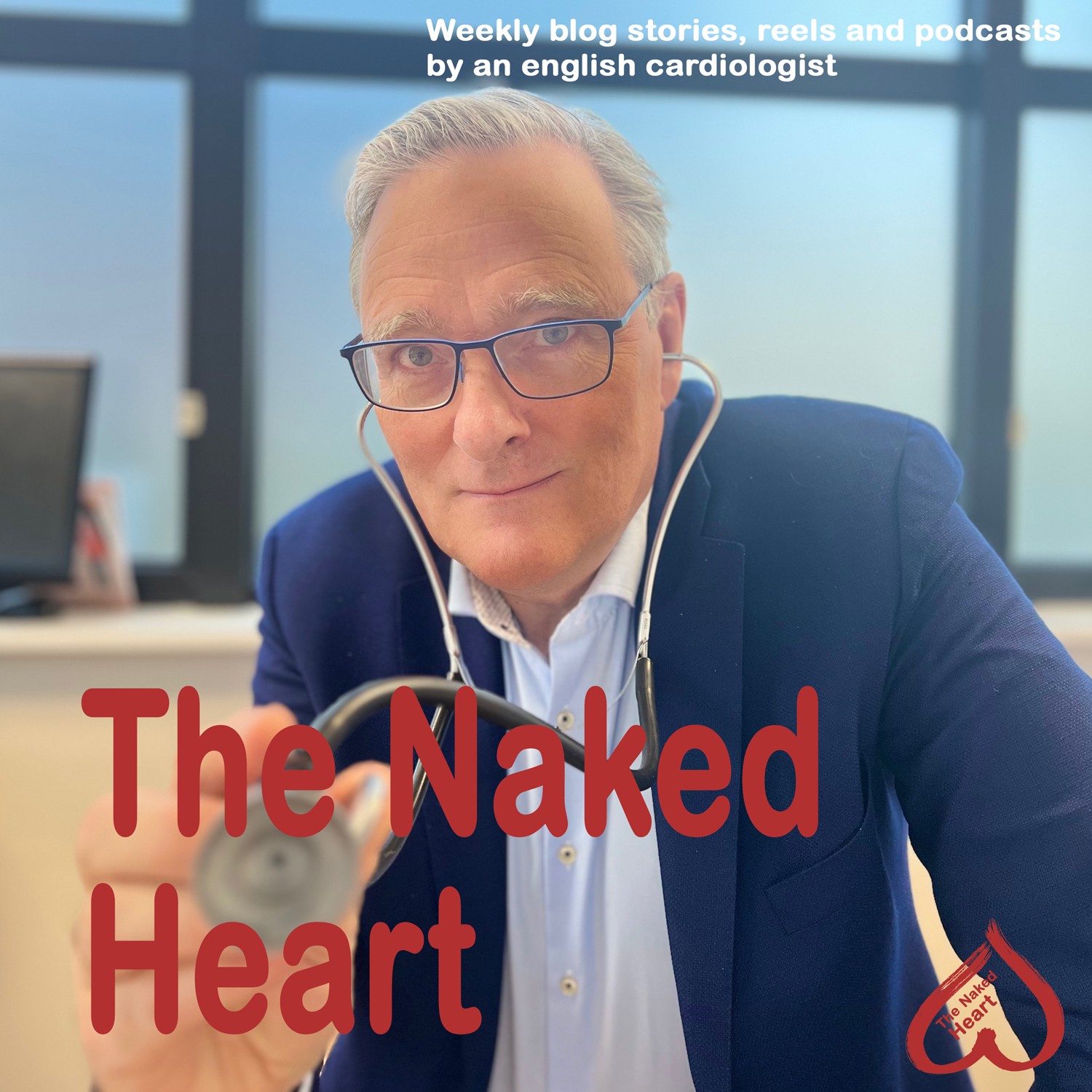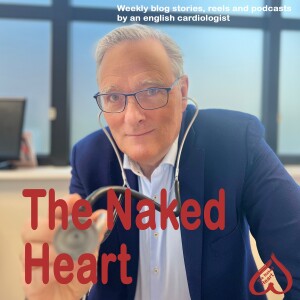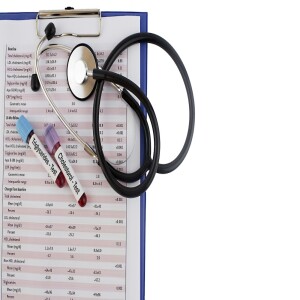
1.9K
Downloads
36
Episodes
The Naked Heart is a weekly series of blogs and social media publications from English cardiologist Dr Edward Leatham. His brief is to apply 50 years of ”breathing and practicing” cardiology to make his day to day job more about educating patients than simply just diagnosing and treating them. ”The only way modern medicine can cope with the ever increasing demand is by educating our patients on basic principles and then encourage every patient to become their own physician, guided by their doctors” These podcast publications are AI constructs created to broaden the audience in an attempt to explain quite complicated, yet important facts thus sharing advances in medical knowledge with more people, ideally even before they become our patients. Each podcast is designed to broadcast alongside a weekly blog article with multiple reels and posts on social media, all accessible for free and without any product advertising via https://www.scvc.co.uk/category/naked-heart/
The Naked Heart is a weekly series of blogs and social media publications from English cardiologist Dr Edward Leatham. His brief is to apply 50 years of ”breathing and practicing” cardiology to make his day to day job more about educating patients than simply just diagnosing and treating them. ”The only way modern medicine can cope with the ever increasing demand is by educating our patients on basic principles and then encourage every patient to become their own physician, guided by their doctors” These podcast publications are AI constructs created to broaden the audience in an attempt to explain quite complicated, yet important facts thus sharing advances in medical knowledge with more people, ideally even before they become our patients. Each podcast is designed to broadcast alongside a weekly blog article with multiple reels and posts on social media, all accessible for free and without any product advertising via https://www.scvc.co.uk/category/naked-heart/
Episodes

Monday Jul 28, 2025
Monday Jul 28, 2025
Dietary fats have been wrongly maligned for much of modern nutritional history. But as the science evolves, it's clear that fat – far from being harmful – is a vital macronutrient that supports energy metabolism, hormonal health, brain and heart function, and even weight control.
Rather than fearing fat, we should focus on:
Avoiding refined carbohydrates and ultra-processed foods.
Prioritising whole food sources of fat, including nuts, seeds, dairy, eggs, fish, and healthy oils.
Understanding individual needs, especially in those with insulin resistance or carbohydrate sensitivity.
Viewing nutrition in context, rather than isolating single nutrients as heroes or villains.
The time has come to move beyond fat-phobia and embrace a more nuanced, evidence-based approach to eating. In a balanced, whole-food diet, fat is not the problem — it’s part of the solution.

Monday Jul 14, 2025
Monday Jul 14, 2025
As we age — particularly if we have inherited genes that predispose us to metabolic disarray that accompanies modern diet and lifestyles, we start to gain weight as visceral fat increases, and muscle mass declines. This double effect worsens blood pressure, cholesterol triglycerides, and blood sugar — contributing to what is known as the metabolic syndrome. Fat cells that have reached their capacity to store extra energy as a healthy reserve start to cause havoc by releasing free fatty acids and in turn worsens insulin resistance, that steepens the decline in health.
However in many cases if we can reduce visceral fat, rebuild muscle, and reach a caloric deficit, we can reverse many of these effects.

Thursday Jul 10, 2025
Protein, Sarcopenia, and the Pursuit of Healthspan
Thursday Jul 10, 2025
Thursday Jul 10, 2025
In the UK, the recommended minimum daily protein intake is 0.75g per kilogram of body weight. However, mounting evidence suggests that this baseline is not enough, especially for older adults, those managing chronic conditions, or anyone engaging in weight loss strategies.
In practice, most people are falling short of even this modest target. In this article and podcast, strategies to maintain skeletal muscle mass to improve metabolic health and reduce the risk of sarcopenia are aired. Could equipping our patients attending our holistic GLP-1 mimetic clinic with a food analysis app called Dr Shape and other items in our metabolic toolbox really be the answer?
Read the blog article here

Tuesday May 13, 2025
Why Cardiovascular Prevention Matters Before 30
Tuesday May 13, 2025
Tuesday May 13, 2025
Emerging evidence shows that lifetime exposure to LDL cholesterol and high glucose variability are some of the strongest predictors of cardiovascular risk. Just as lung cancer risk is tied to pack-years of smoking, heart disease risk correlates with cumulative LDL levels and impaired glucose metrics over time.
This is why some people in their 20s with risk factors (like diabetes or a family history of heart disease) are starting statin therapy preventatively. However, many are understandably hesitant to start medication so early. Lifestyle changes remain the cornerstone of early prevention.

Monday May 05, 2025
Cardiovascular Health Under 20: A Guide for Young People and Their Families
Monday May 05, 2025
Monday May 05, 2025
It may seem unusual to talk about heart disease in teenagers and children, but the groundwork for heart health is laid early in life. Habits formed in youth often carry into adulthood, and many cardiovascular risk factors—like high cholesterol, high blood pressure, or obesity—can be silent, slowly progressing without symptoms.
In families where heart disease runs deep, understanding risk and prevention from a young age can be life-changing.

Tuesday Apr 29, 2025
Cardiovascular Prevention: Why Waiting Until 60 Is Too Late
Tuesday Apr 29, 2025
Tuesday Apr 29, 2025
Cardiovascular disease often strikes decades before symptoms appear, especially in the critical age range known as *"Sniper’s Alley"* (40–60 years). Waiting until 60 is too late. Early prevention, particularly LDL cholesterol control, saves lives. Learn why family history demands a proactive approach — and why starting young matters.

Friday Apr 11, 2025
Friday Apr 11, 2025
In recent years, there has been a noticeable shift in how individuals approach their health and wellbeing. With increasing public awareness around the importance of early detection and preventative medicine, combined with the reduced accessibility of primary care appointments, online home blood testing has rapidly gained popularity. This change has been further fuelled by the undeniable convenience of testing at home or visiting one of many independent providers offering blood test services across the UK.

Saturday Mar 15, 2025
The Cardiometabolic Clinic
Saturday Mar 15, 2025
Saturday Mar 15, 2025
With continued advancements in imaging, pharmacology, and personalised medicine, the SCVC cardiometabolic clinic is positioned to lead the way in preventative cardiology. The integration of real-time metabolic assessments, cutting-edge lipid profiling, and targeted pharmacotherapy represents a paradigm shift in how cardiovascular risk is managed.

The Naked Heart
In 2021, after 35 years as a front line NHS physician and 25 years as consultant interventional cardiologist, Dr Edward Leatham left the catheter lab and moved into prevention. The Internet is a source of confusing, unregulated and, at times, crackpot advice. In response to demand, he agreed to publish a series of weekly blogs, social media reels and posts to guide a non medical audience on genuine contemporary stories and lifestyle advice. The naked heart podcast is an additional resource that comprises two virtual presenters who talk around each blog story published. Due to constraints on time and limited resources the podcasts are, for now, entirely produced using an AI-guided processing of his original stories. The hope is that we can reach a wider audience and steer more people towards preventing cardiovascular disease, instead of fire fighting it once it presents.
Prevention is better than cure.
